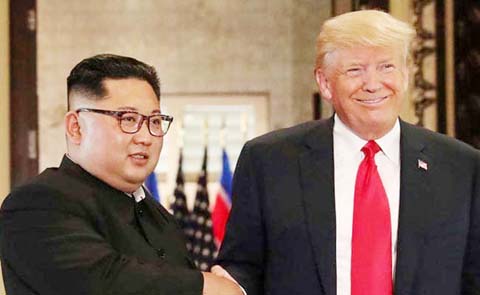
As Donald Trump seeks progress with North Korea at a second summit, the United States has a series of cards it can play including easing sanctions, signing a peace declaration or even pulling troops from South Korea.
After the historic handshake between the US president and North Korean leader Kim Jong Un in Singapore in June, Washington policymakers are adamant on the need for tangible concessions by Pyongyang on its nuclear program at the sequel meeting, which Trump says will take place around late February, with Vietnam the most likely venue.
But much depends on the mercurial Trump, who has declared his outreach to the longtime US adversary to be a diplomatic coup and angrily denounced criticism that his first summit was mere symbolism.
North Korea watchers believe that Kim’s primary goal is relief from international sanctions and doubt he will suddenly give up his nuclear arsenal, which his dynastic regime has built for decades even through famine.
The sanctions “are not strong enough to create serious economic problems in the country, but they are strong enough to make economic growth difficult or unachievable,” said Andrei Lankov, a professor at Kookmin University in Seoul who studied in Pyongyang.
“In order to maintain stability in the country and to stay in power, the North Koreans know they will have to end or at least narrow the yawning gap between their economy and the economies of the neighboring countries, especially South Korea and China,” he said.
When Kim met Trump, the first-ever summit between the two nations, North Korea was seen as seeking a treaty or at least statement formally ending the 1950-53 Korean War, which ended in an armistice.
But Victor Cha, the director of Asian studies at Georgetown University and former US negotiator with North Korea, said a peace declaration was ultimately symbolic.
“I don’t think they would say no to it. A peace declaration would be a sign of non-hostile intent. But they want tangible evidence of non-hostile intent, which would be removing some of the sanctions,” Cha said.
Secretary of State Mike Pompeo has vowed no let-up in sanctions until North Korea denuclearizes. And many US sanctions involve human rights or corruption laws and cannot be lifted without intervention by Congress, which is unlikely to be sympathetic.
But Cha said the United States could offer relief indirectly through South Korea’s dovish government, working at the United Nations to remove sanctions that impede the restart of inter-Korean projects such as the Kaesong industrial complex.

